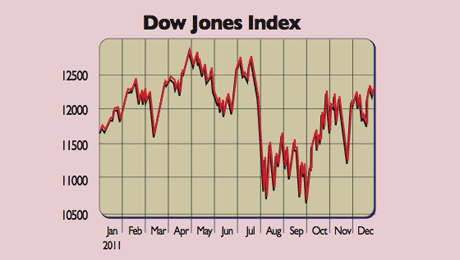Get the latest financial news, insights and expert analysis from our award-winning MoneyWeek team, to help you understand what really matters when it comes to your finances.
You are now subscribed
Your newsletter sign-up was successful
Want to add more newsletters?

Twice daily
MoneyWeek
Get the latest financial news, insights and expert analysis from our award-winning MoneyWeek team, to help you understand what really matters when it comes to your finances.

Four times a week
Look After My Bills
Sign up to our free money-saving newsletter, filled with the latest news and expert advice to help you find the best tips and deals for managing your bills. Start saving today!
America was the best-performing major developed market in 2011. The Dow Jones index gained 4.7% and the S&P finished flat. Unlike struggling European markets, their resilience looks set to continue.
That's because, "in contrast to other parts of the developed world, the US economy has picked up speed in recent months", says Jessica Brown in The Sunday Times. Consumer confidence is at its highest since April. The four-week moving average of new claims for unemployment benefits has eased to its lowest since June 2008. Even the housing market is showing signs of life: an index of pending house sales is at an 18-month high. Business investment looks "relatively healthy" and "the US consumer is spending, albeit cautiously", says FxPro.com.
Still, the recovery remains fragile and a growth spurt comparable to previous post-war recoveries is not on the cards. The hole in the labour market is deep and consumer confidence is climbing from historically low levels. Consumption, which accounts for 70% of the economy, averaged 3.6% in the decade before the crisis. In the third quarter of 2011, it reached 1.7%, says Stella Dawson on Reuters.com. Poor or negative recent wage growth and heavy debt loads are the key culprits.
MoneyWeek
Subscribe to MoneyWeek today and get your first six magazine issues absolutely FREE

Sign up to Money Morning
Don't miss the latest investment and personal finances news, market analysis, plus money-saving tips with our free twice-daily newsletter
Don't miss the latest investment and personal finances news, market analysis, plus money-saving tips with our free twice-daily newsletter
Household debt as a proportion of disposable income may have fallen to130%, but the 1970-2000 average was 75%. So there is still a lot of debt to work off, implying years of subdued growth. Moreover, if Congress fails to extend the payroll tax cut and unemployment benefit extension beyond February, growth will be undermined.

Throw in record margins, and it's hard to see American earnings jumping sharply, especially as the rest of the world is slowing and almost half of S&P 500 firms' sales are made overseas. But while profit forecasts are subdued, America's larger companies are sitting on big piles of cash, which bodes well for dividend growth, says Paul J Lim in The New York Times. Howard Silverblatt of Standard & Poor's expects S&P 500 dividends to rise by almost 11% in 2012.
Given all this, defensive, dividend-paying American stocks, such as MoneyWeek favourite Microsoft, are likely to be highly sought-after this year. The likely strength of the US dollar makes them even more appealing.
Get the latest financial news, insights and expert analysis from our award-winning MoneyWeek team, to help you understand what really matters when it comes to your finances.
MoneyWeek is written by a team of experienced and award-winning journalists, plus expert columnists. As well as daily digital news and features, MoneyWeek also publishes a weekly magazine, covering investing and personal finance. From share tips, pensions, gold to practical investment tips - we provide a round-up to help you make money and keep it.
-
 How to navigate the inheritance tax paperwork maze in nine clear steps
How to navigate the inheritance tax paperwork maze in nine clear stepsFamilies who cope best with inheritance tax (IHT) paperwork are those who plan ahead, say experts. We look at all documents you need to gather, regardless of whether you have an IHT bill to pay.
-
 Should you get financial advice when organising care for an elderly relative?
Should you get financial advice when organising care for an elderly relative?A tiny proportion of over 45s get help planning elderly relatives’ care – but is financial advice worth the cost?

